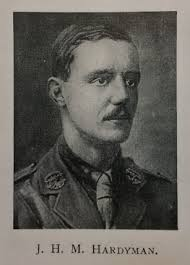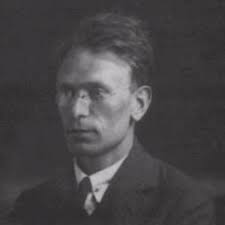J
John was born in Bath on 28th September 1894. He was the eldest son of Dr. George H. Perrymead Hardyman, a medical practitioner, and his wife Eglantine Henrietta Keith, nee Maitland, who were both originally from Scotland. John’s siblings were: Constance Christian Beatrice Beath, b. 1893, Malcolm, b. 1896, Myrtle Rothes Eglantine, b. 1899, Harry Frederick Ralph, b. 1900 and George Hugh Murray, b. 1903.Educated at Hamilton House School in Bath, then Fettes College, Edinburgh University in Edinburgh, John joined Prince Albert’s (The Somerset Light Infantry) Regiment on 19th August 1914. He joined the Royal Flying Corps as a pupil pilot at Brooklands in December 1914, but after two accidents in the air, he re-joined his Regiment in January 1915 and was promoted to the rank of Second Lieutenant on 23rd February 1915.
On 19th November 1916, John was promoted to the rank of Lieutenant and on 12th April 1917 to the rank of Major. On 13th April 1917, he was promoted to the rank of Lieutenant-Colonel, thus becoming the youngest Lieutenant-Colonel in the British Army at that time. He was twice Mentioned in Despatches by Field Marshall Sir Douglas Haig.
John was killed on 24th August 1918 and was buried in Bienvillers Military Cemetery, Pas de Calais, France, Grave Reference: XIX.F.11.
"From a Base Hospital in France" by John Hay Maitland Hardyman
Christ I am blind! God give me strength to bear
That which I most have dreaded all my days:
The palsied shuffling grasping air,
The moving prison five foot square
The haunting step that isn’t there –
These pictures dance before my sightless gaze …
Sources: “Poetry of the First World War” edited by Marcus Clapham Pp 85 and 167
John’s First World War poetry collection, “A Challenge”, originally published by Allen & Unwin, London in 1919, is available to read as a free download: http://www.archive.org/stream/challenge00hard#page/n11/mode/2up
In the Foreword we read:
"... a world out of which the standard he aimed at and the goal he was like seem to have vanished amid the chaos of dissolution on the one hand, and the madness of ill-conceived avarice on the other."
Page 6 of "A Challenger by Maitland Hardyman, Foreword by Norman Hugh Romanes, page 6. (Published by George Allen and Unwin, Ltd., London, 1919).

